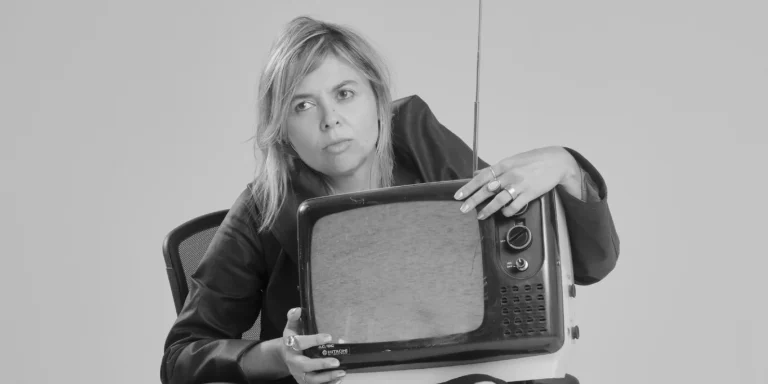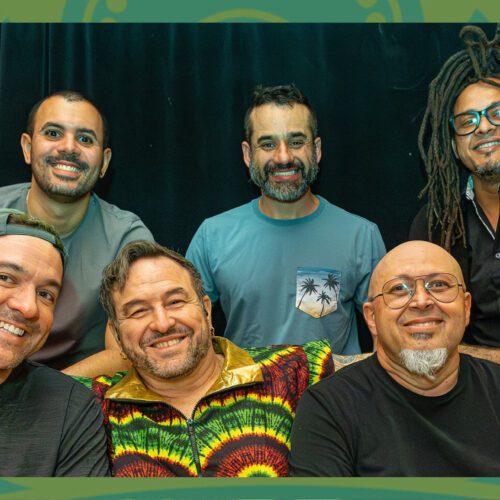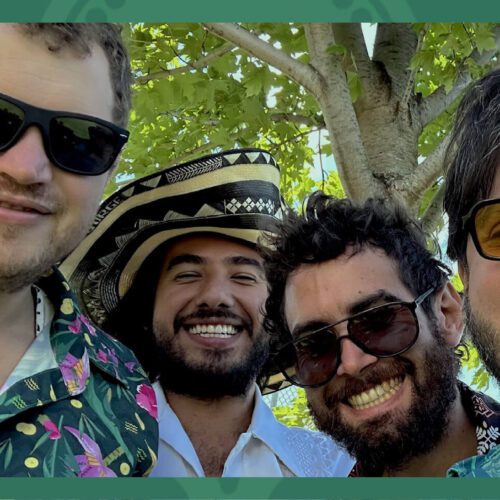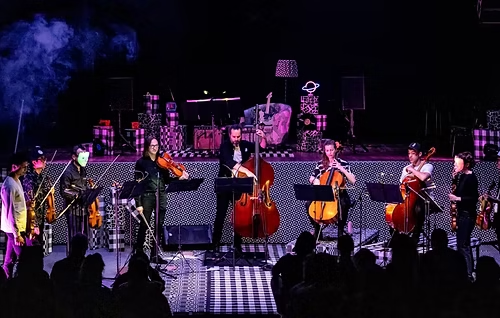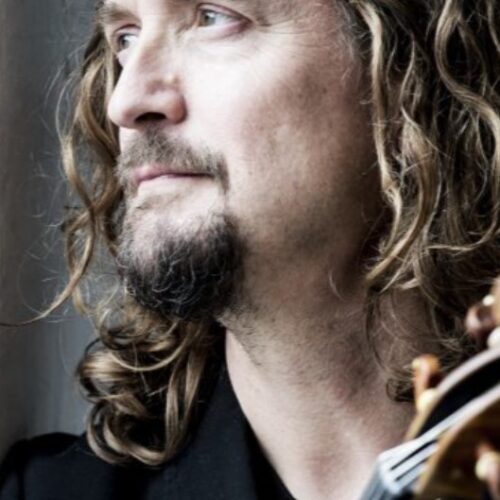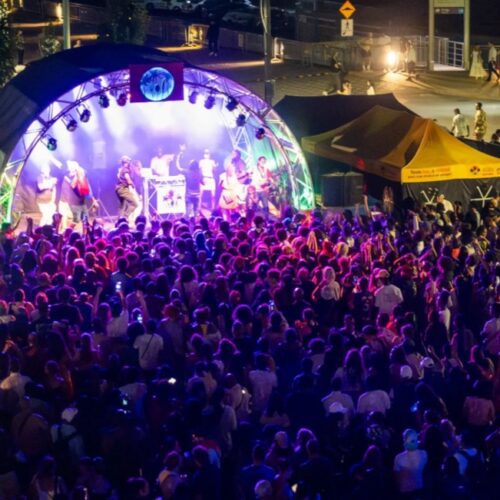Additional Information
In an overview of Lizée’s career (work from 2001, Jupiter Moon Menace, will be performed alongside an exclusive new creation, Ultraviolet Blues), it will be possible to understand why the music of this composer, who is also fascinated by rock, turntablism and science fiction, is one of the most interesting and even fundamental to have emerged at the beginning of the 21st century.
The syncretism that Lizée manages to create is unparalleled in the musical world and acts like a nuclear fusion reactor in which High and Low cultures are invited. Classical instruments and new lutherie (from the turntable to the old Moog, from non-instruments to the most complex of the European tradition) lose their usual hierarchy, while references to the retro-futurism of vintage science-fiction gain letters of nobility that the guardians of the current temple of so-called serious literature stubbornly refuse to grant it.
I met with Nicole Lizée and discussed her music and many other topics that highlight her fascinating vision of what modernity is in music.
PAN M 360: The concert is called Folk Noir. Why is it called Folk Noir?
Nicole Lizée: It’s the title of a piece I wrote in 2017 for the same ensemble (Collectif9) and Architek, a percussion ensemble. It is emblematic of my interest in associations of unusual terms. Combinations that draw strange landscapes and atmospheres.
PAN M 360: It’s a program that has the air of a retrospective, with a piece from your early days and a very recent creation…
Nicole Lizée: Yes, but with an emphasis on the trippy (psychedelic?) aspect of my work. These are pieces in which the origin of the sounds is not assured. Acoustic instruments, electro, tapes, everything mixes together and disturbs the listener’s sense of sound orientation.
PAN M 360: About this new piece, called Ultraviolet Blues, what can you tell us about it?
Nicole Lizée: It’s a tribute to the Blacklight Poster, a psychedelic art form that emerged in the 1960s in the United States. Posters were printed with ink that fluoresced under black light (an ultraviolet reaction). Sonically, the piece does not reference stereotypical or preexisting elements of the sound of psychedelia. There are no quotes of existing music. It is my sonic interpretation of blacklight art as it exists in the 21st century: ‘post-blacklight.’ The sound world is highly rhythmic, but the grooves stretch and splinter, sometimes disintegrating. The fluorescence, vibrations, and textural fuzziness in the artwork is depicted through a number of sonic techniques. As is the energy, euphoria, and the notions of darkness.
Melodies (including a main theme) move to the forefront and begin to melt. The is a melancholic component to it all, referencing the notion that this artistic movement experienced a number of deaths: the first was its commodification in the late 1960s/early 1970s. The mainstream saw it as a way to make money but only after tampering with (i.e. censoring) and ultimately, softening, the subject matter considerably, rendering it meaningless (simply functioning as eye candy). There was a period when artists and poster collectors saw it as a means of expression: politically, etc.
After a resurgence in the 1980s – which began again as a way to express the counterculture of the period, with its highly evocative design – the blacklight poster phenomenon largely fizzled out. Now it joins other art forms that don’t exist anymore due to the death of print and other factors.
The blacklight poster was actually a medium capable of mimicking the effects of (a) new wonder drug. With the ability to glow and vibrate under ultraviolet light, the posters could simulate the sensations and visual distortions one experienced during an acid trip.
- Daniel Donahue, counterculture historian
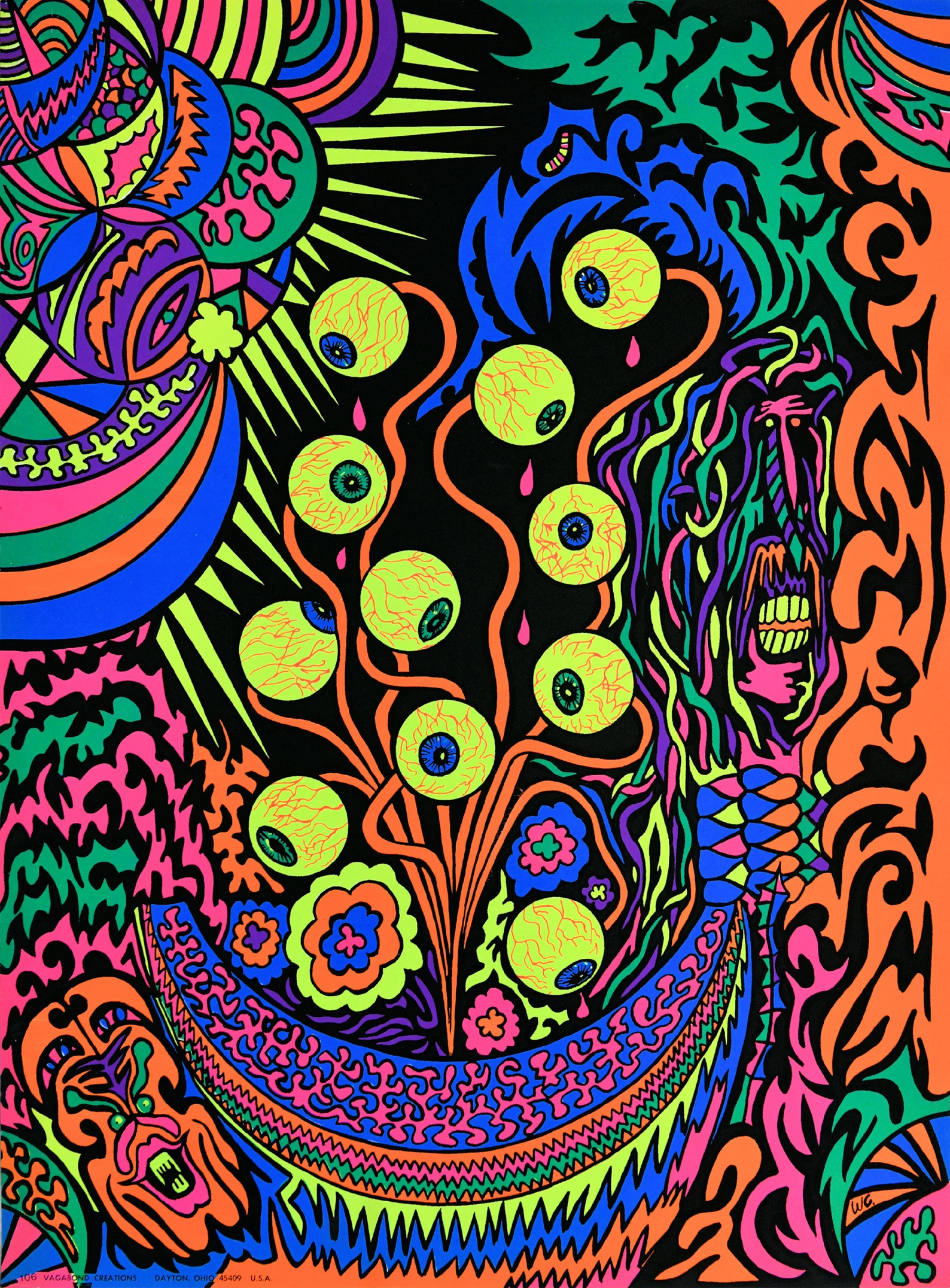
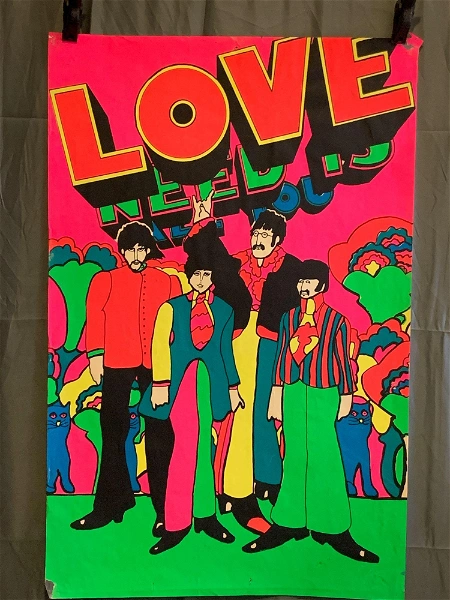
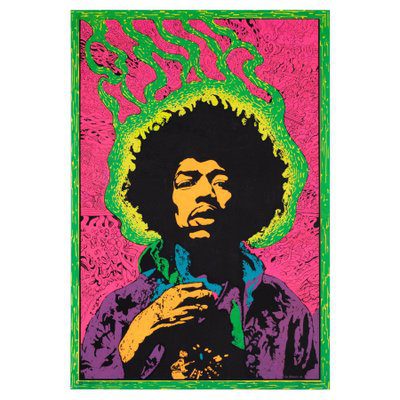
PAN M 360: How has your almost 25-year musical career evolved?
Nicole Lizée: I realize that while my subjective foundations remain the same, the desire to go beyond traditional notation has become more pronounced. I want to evoke all sorts of unusual panoramas and impressions in my music, but I find that traditional notation (clefs, barlines, staves, etc.) does not allow me to explain to musicians what I really want to create. In my most recent scores, the system totally falls apart! And it works fine.
PAN M 360: But it still involves a lot of communication with the performers, if you want to be well understood since your system is not standard and its references may not be known by the instrumentalists.
Nicole Lizée: Yes, of course. That’s the beauty of working in contemporary music.
PAN M 360: How tight are you with your colleagues? Does their initial understanding of your scores ever take you elsewhere, and transform the nature of the piece? Do you let it happen? And when, in the future, new people appropriate your music and try to decode your inscriptions, is it possible that they will make conclusions that are totally alien to your aspirations, absurd even?
Nicole Lizée: Yes, there is that. But as far as my work with musicians is concerned, it’s a give and take. Of course, I have a precise conception of what I want to project into the sound space, but the musicians have to absorb the music too. That’s a great thing! There are so many things I can’t put on paper, so if the musicians allow me to express it with their understanding of what I’m writing, that’s great! Anyway, the page is just the beginning of the process.
PAN M 360: You grew up surrounded by popular culture. How did you come to dive into the very serious world of contemporary music?
Nicole Lizée: First of all, in all these years, I never knew what “contemporary music” was. I was always interested in sounds, in originality, and in non-conformism. I had several phases that I would describe as obsessive. I would dive totally into one musical universe, before moving on to another, and so on. I started with New Wave, but then I needed something else and that was Metal, which I explored further and further by going deeper and deeper into “hardness”, lol. Then, again, I craved something else, and that was Kate Bush, Sonic Youth, and the Manchester sound. I had my hip-hop phase and one day I wanted to learn, to know more, and most of all to be officially a composer. I came to McGill and was shocked to hear that “classical” music also had its avant-garde. But there was never any clear notion in my mind of a difference between different types of avant-garde.
PAN M 360: Was there any resistance to your musical fusion in the community?
Nicole Lizée: I can’t say that there wasn’t. For example, when I wanted to write my Turntable Concerto, of course, people asked me where I was going with it. But on the other hand, there was also a lot of enthusiasm! I remember one day I had just finished writing it, exhausted after weeks of hard work, and I was talking to some friends. I said “I’ve finished, but I don’t know how I’m going to find someone to play it” and at that moment, like in a slow-motion scene in a movie, a colleague turns to another, points and slowly says “Why not Paolo?’’ He was a trumpet player but also a DJ. I asked Paolo “Do you want to play my concerto?” and he just said, “Yeah, sure.” Then the conductor doubted whether a DJ could survive such a precise performance as a contemporary creation. We went to rehearsal once at his place, and Paolo nailed it perfectly! The conductor was convinced, and it worked. So yes, a little resistance, but not bad faith. Given the facts and the quality of the product, everyone got on board. And it’s been going on ever since. I love integrating obsolete machines with unique sounds in a context of rigorous interpretation. To me, these are legitimate instruments, like an oboe or a clarinet.
PAN M 360: Is there a dream project that you haven’t realized yet?
Nicole Lizée: Recently, I wrote an opera, a medium I didn’t even consider just a few years ago (RUR: A Torrent of Light, based on a 1920 play by Karel Čapek, a science fiction pioneer. It was in this text that the word robot was first used. The premiere took place at the Tapestry Opera in Toronto – NDLR). But in the future, I must admit that I would like to direct a feature film and compose the music for it. A fully integrated work, where the image is intrinsically dependent on the music and sound, not the other way around.
PAN M 360: A bit like John Carpenter or Godfrey Reggio’s films set to Philip Glass’ music…
Nicole Lizée: Yes. I like Carpenter a lot, even if his music is relatively uncomplicated, the fact that a single head has thought about the link between image and sound/music is a fascinating aspect of creative perspectives.
PAN M 360: Are you a fan of science fiction?
Nicole Lizée: Yes, but specifically from the 1960s or so. I love retro-futurism, the kind that is no longer relevant because it is beyond its intended time frame. Nevertheless, it was in those years that the future was written! It goes hand in hand with my fascination for obsolete machines, old synths, modulators, outdated electronics, etc.
PAN M 360: Has the time for science fiction as a subject of inspiration finally come to the world of contemporary music-making?
Nicole Lizée: Yes, I think so. The opera on Čapek’s play that I wrote is an example. There are so many beautiful stories, magnificent subjects, characters, places, and situations from which a whole universe of meaning is invited, and through which we can commune in a reflection on our own world!
PAN M 360: Just like the myths of ancient Greece and Rome that have nourished us for more than two millennia!
Nicole Lizée: Yes, absolutely.
PAN M 360: You might be curious to hear an opera based in the Star Trek universe, and sung in Klingon (a language invented and associated with one of the main alien races of the Trek world)!
Nicole Lizée: Wow! I’m definitely going to look that up.
PAN M 360: Finally, five quick questions, quick answers, as many as possible. Challenges with hard choices. Shall we go?
Nicole Lizée: Sure!
PAN M 360: AI (Artificial Intelligence): threat or opportunity?
Nicole Lizée: Strong both. I have strong feelings, but divergent ones. Yes, a threat in the short term, for sure. But in the long run? Will we find a way to deal with it, and do something new? Possibly.
PAN M 360: Dodecaphonism/serialism: dead or still alive?
Nicole Lizée: Mmmm, dead is too strong a term. I would say: History
PAN M 360: Women in contemporary composition (musically speaking, only. I’m not talking about the social and societal aspect of it, of course): revolution or “business as usual”?
Nicole Lizée :… (Long silence)… I would say revolution because the subjects and the stories can only be personal, and thus dictate the color of the music itself. As the subjects and stories, from a non-male perspective (I avoid binarity), will be unique to being female or queer or non-binary, etc., this will inevitably give a unique narrative, with its musical corollary. That said, I hesitated to choose revolution because it is not over! It is underway, but far from having reached its optimal and final bloom.
PAN M 360: Turntables in contemporary music: flavor of the day or new sustainable lutherie?
Nicole Lizée: I love this instrument and I’ve been convinced of its legitimacy for a long time, so I would say it’s sustainable. But I see that it can become the flavor of the day when you start putting it everywhere just to check a box, or sell tickets without thinking about the real depth of the offer.
PAN M 360: If you had to choose with whom to spend your time on a desert island talking about music: Pierre Boulez or Philip Glass?
Nicole Lizée: Oh, that’s the hardest one! What a crazy question, I love it! Ok, you know what, I would choose… Mmmm, no…. Aaaaarrrrgh! I can’t say I’ve listened to much Boulez, but as much as I love the early Glass, the psychedelic Glass, I don’t like everything either. I don’t know. I think I’d like to invite them both to my table at the same time. What an exchange that would be!
PAN M 360: They are symbols of the fundamental opposition of our time in contemporary music. A bit like the Brahms vs Wagner camps in the 19th century…
Nicole Lizée: Exactly. Yes, a meal with both at the same time would be very entertaining!
